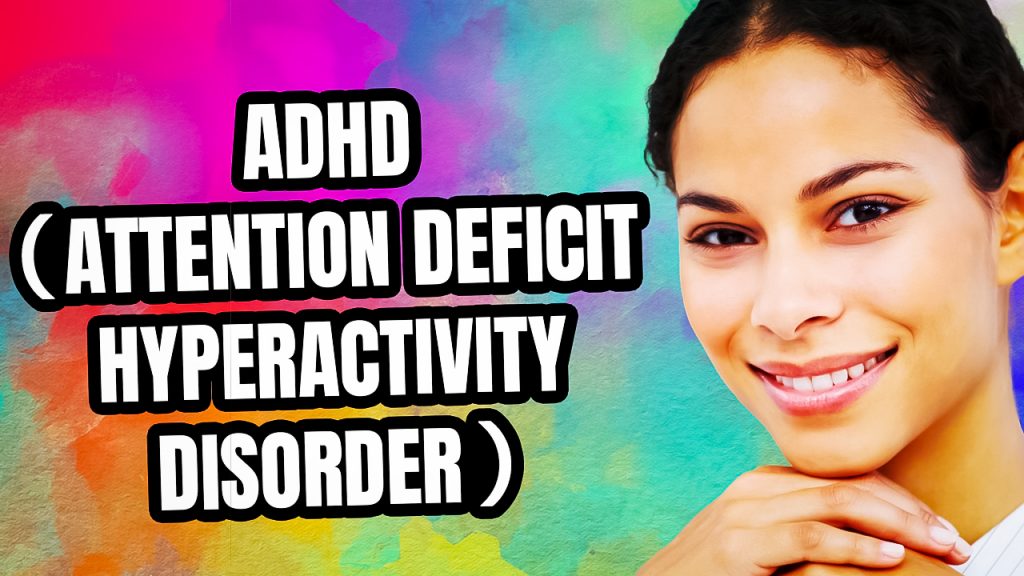
Attention Deficit Hyperactivity Disorder, commonly known as ADHD, is a neurodevelopmental
disorder that affects a person’s ability to pay attention, control impulsive behaviors, and regulate
hyperactivity. It is estimated to affect around 5-10% of children worldwide, and about 4% of
adults.
ADHD is characterized by three main symptoms: inattention, hyperactivity, and impulsivity.
Inattention is the inability to focus and stay on task, easily distracted, forgetful, and frequently
makes careless mistakes. Hyperactivity is excessive motor activity, such as constant fidgeting or
restlessness, difficulty staying seated, and feeling the need to move constantly. Impulsivity is
acting without thinking first, such as interrupting others or blurting out inappropriate comments.
ADHD can be classified into three types: predominantly inattentive type, predominantly
hyperactive-impulsive type, and combined type. Predominantly inattentive type is characterized
by primarily experiencing symptoms of inattention. Predominantly hyperactive-impulsive type is
characterized by primarily experiencing symptoms of hyperactivity and impulsivity. The
combined type is the most common type and is characterized by experiencing symptoms of
both inattention and hyperactivity-impulsivity.
ADHD is usually diagnosed in childhood, and symptoms can be observed as early as preschool.
The exact cause of ADHD is not yet known, but researchers have identified several potential
factors that contribute to the disorder, such as genetics, environmental factors, and brain
structure and function.
Research has shown that genetics plays a significant role in ADHD. Studies have found that the
disorder tends to run in families, and there is a high degree of heritability. Environmental factors
can also contribute to the disorder, such as exposure to toxins or infections during pregnancy
and early childhood.
Brain imaging studies have shown that people with ADHD have structural and functional
differences in certain parts of the brain. These differences are most prominent in the prefrontal
cortex, which is responsible for executive functions such as attention, planning, and
decision-making.
ADHD can have a significant impact on a person’s life. Children with ADHD often struggle
academically, socially, and emotionally. They may have difficulty with organization, time
management, and completing tasks. Adults with ADHD may struggle with maintaining
employment, relationships, and managing daily responsibilities.
Treatment for ADHD typically involves a combination of medication, therapy, and behavioral
interventions. Stimulant medications, such as Ritalin and Adderall, are the most common type of
medication used to treat ADHD. These medications work by increasing dopamine and norepinephrine levels in the brain, which can improve attention and reduce hyperactivity and
impulsivity.
Behavioral interventions are also an essential part of ADHD treatment. These interventions
focus on teaching individuals with ADHD strategies to improve their attention, organization, time
management, and social skills. Cognitive-behavioral therapy (CBT) is often used to teach
individuals with ADHD strategies for managing their symptoms and developing coping skills.
In addition to medication and therapy, lifestyle modifications can also be helpful for managing
ADHD symptoms. These modifications include regular exercise, a healthy diet, and adequate
sleep.
It is important to note that there is no cure for ADHD. However, with appropriate treatment and
support, individuals with ADHD can learn to manage their symptoms and lead successful and
fulfilling lives. Early intervention is crucial, as it can help children and adults with ADHD develop
the skills they need to manage their symptoms and achieve their goals.
In conclusion, ADHD is a neurodevelopmental disorder that affects a person’s ability to pay
attention, control impulsive behaviors, and regulate hyperactivity. It is characterized by three
main symptoms: inattention, hyperactivity, and impulsivity. ADHD can have a significant impact
on a person’s life, but with appropriate treatment and support, individuals with ADHD can learn to
manage their symptoms and lead successful lives. The exact cause of ADHD is not yet known,
but genetics, environmental factors, and brain structure and function are all believed to play a
role in the disorder. Diagnosis of ADHD usually occurs in childhood, but it can also be
diagnosed in adults.
There is a misconception that ADHD only affects children, but in reality, many adults also
struggle with the disorder. In some cases, the symptoms may not have been properly diagnosed
or managed in childhood, leading to ongoing difficulties in adulthood. ADHD can also develop
later in life due to brain injury, stroke, or other medical conditions.
Adults with ADHD may struggle with maintaining employment, relationships, and managing daily
responsibilities. They may also experience feelings of low self-esteem, anxiety, and depression.
It is important for adults with ADHD to seek proper diagnosis and treatment, as this can
significantly improve their quality of life.
There is still much research to be done on ADHD, but advances in understanding the disorder
have led to improved diagnosis and treatment options. However, there is still a stigma
surrounding ADHD, which can lead to individuals not seeking proper diagnosis and treatment. It
is important to raise awareness about ADHD and promote understanding and support for
individuals living with the disorder.
Overall, ADHD is a complex disorder that can have a significant impact on a person’s life. With
appropriate treatment and support, individuals with ADHD can learn to manage their symptoms and lead fulfilling lives. It is important to continue researching the disorder and promoting
awareness and understanding to improve outcomes for individuals with ADHD.
This Post is Brought To You By BetterHelp